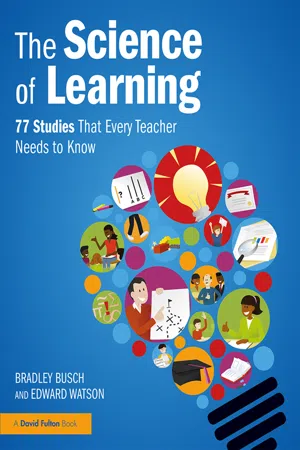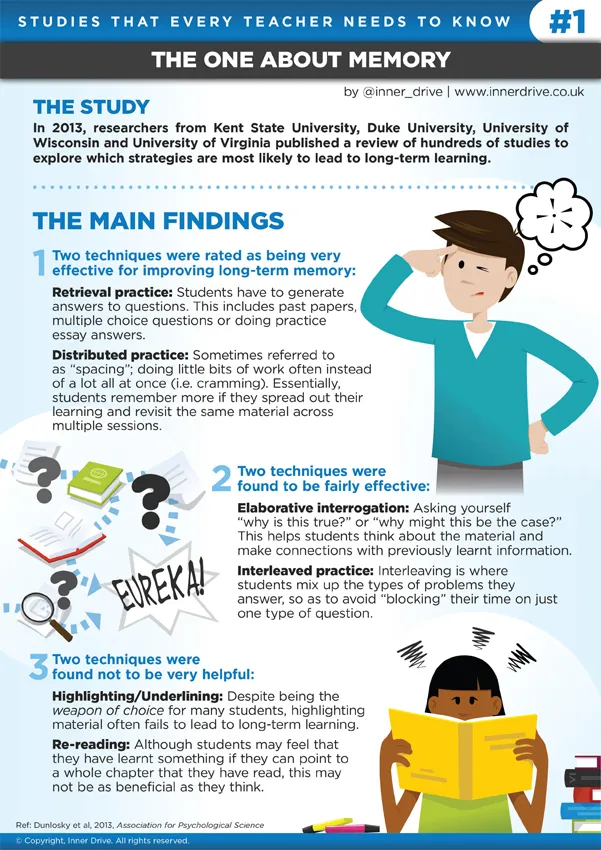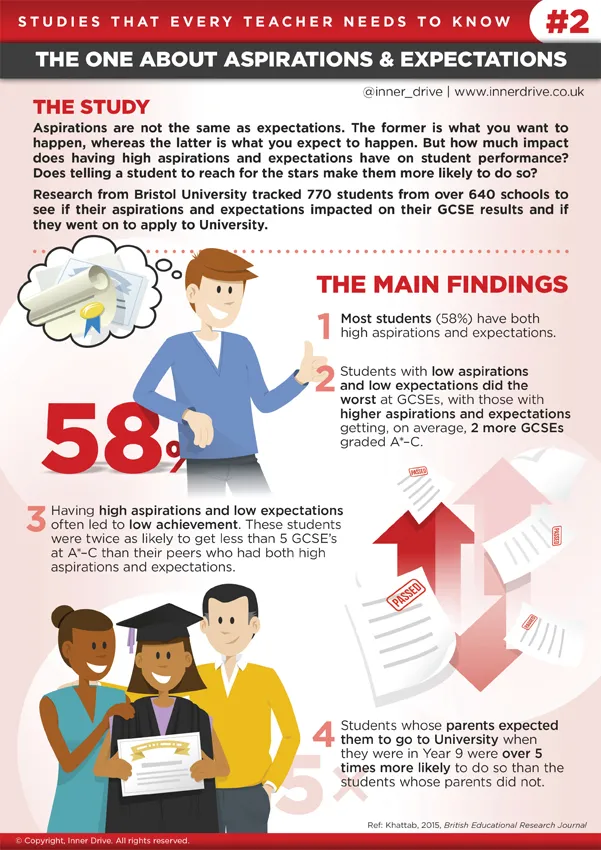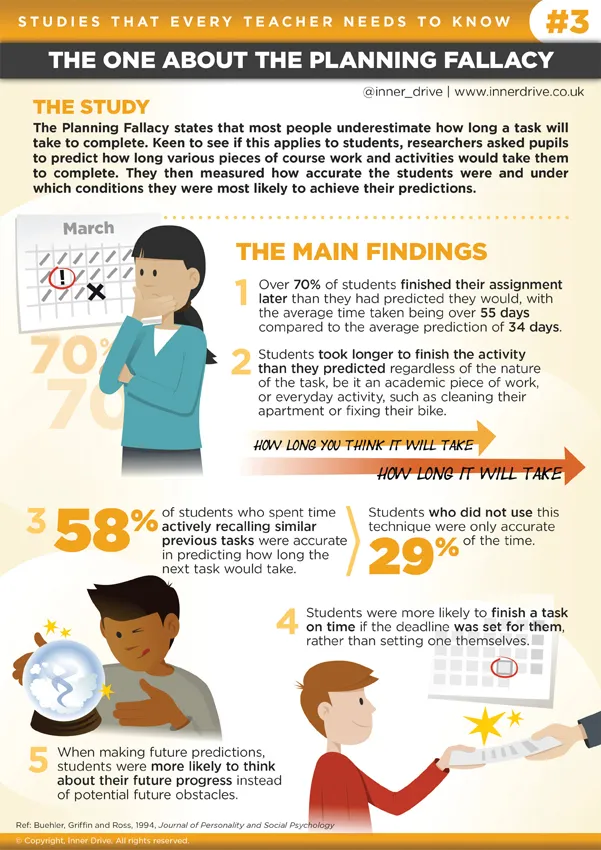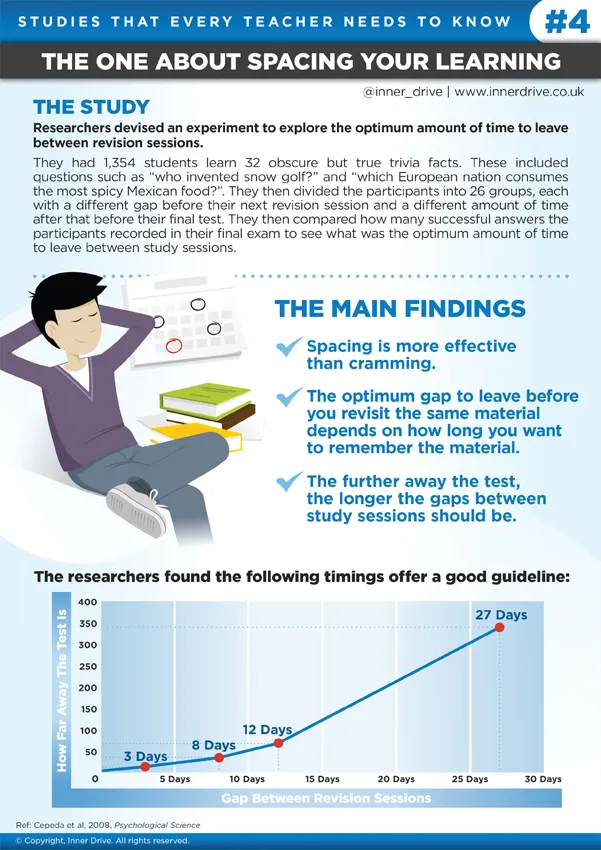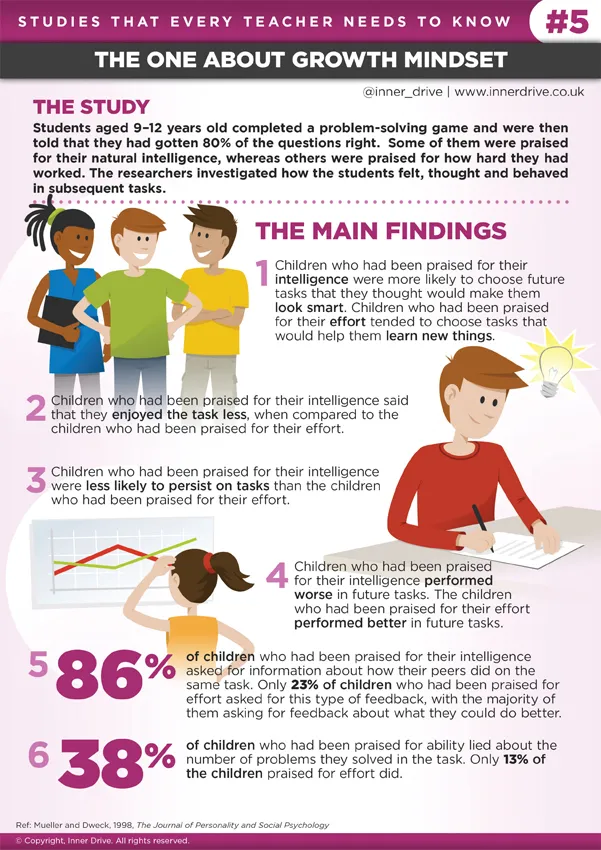![]()
Studies
![]()
1
The One about Memory
Related Research
Numerous researchers from around the world have run studies that support these findings. For retrieval practice to be most effective, it has to be done at “low-stakes”, which means it does not increase stress levels of students and is not used as a form of judgement of their abilities. We still do not know the optimum time to space sessions for distributed practice, which is something currently being explored.
There is evidence to suggest that many students actually prefer to use study strategies that are least likely to lead to better learning. For example, one such study (#23) found that despite leading to lower exam results, students were most likely to rate simply re-reading the core material as more helpful rather than other more effective strategies, such as doing lots of quizzes and tests. Likewise, many continue to revise whilst listening to music, despite this not helping (#17).
Classroom Implications ✔
How can teachers use these findings? It will vary depending on the nature of your cohort and the subject you teach. The testing effect can be harnessed through short quizzes at the start or end of a lesson. Likewise, distributed practice is important in education systems where students no longer do modular exams (such as the UK), so revisiting previous topics is even more important.
It is important that we teach our students what does and doesn’t work. Each minute spent highlighting or re-reading is sixty seconds not spent doing something more effective. As the authors of this study state,
a premium is placed on teaching students content and critical-thinking skills, whereas less time is spent teaching students to develop effective techniques and strategies to guide learning … teaching students to use these techniques would not take much time away from teaching content and would likely be most beneficial if the use of the techniques was consistently taught across multiple content areas, so that students could broadly experience their effects on learning and class grades.
![]()
2
The One about Aspirations and Expectations
Related Research
Subsequent research has found that the majority of aspiration interventions do little to improve educational attainment. Having high aspirations but being unable to achieve them has been found to result in student resentment, frustration and social withdrawal.
The research has been far more positive on the impact and predictive power of high expectations if combined with high aspirations. Having high expectations of themselves has been found to help students have the confidence to answer more questions correctly on a quiz. Research suggests that having high expectations is most beneficial if done at the start of the school year or at the beginning of a new project, as this allows them to approach it with no negative pre-conceptions or ideas.
An interesting related area of research has focused on the impact that parental and teacher expectations has on student performance. In most cases, this has been found to help raise student performance (#9, #11). A word of caution though: if expectations are too high and unrealistic then this can lead to an increase in stress and anxiety (#33).
Classroom Implications ✔
This study suggests that having high aspirations and expectations are important. However, interventions targeting all students may be unsuccessful as many of them already have high levels of both. Programmes targeting selected students who have low aspirations and expectations would likely yield far better results for the time, energy and cost that they would require.
Another approach would be to work with students who already have high aspirations but have low expectations. As the authors of the study note,
the data that has been presented here suggests that policy makers, teachers and other professionals in schools should encourage their students to raise and maintain high levels of aspirations. However, these high aspirations should be reinforced by equipping students, particularly those coming from poor and disadvantaged families, with necessary skills.
These skills include any that help harness the motivation that comes with having high aspirations that can be turned into better grades. These include strategies such as metacognition, self-regulation and effective memory strategies such as spacing, retrieval practice and teaching the material to someone else (#42).
![]()
3
The One about the Planning Fallacy
Related Research
There has been a lot of research on the importance of setting goals and deadlines. Setting goals can help students focus their attention, minimise distractions, and enhance work ethic and persistence. Likewise, setting regular deadlines has been found to help students manage their time and energy over the course of the year as well as improving overall grades (#56). This is because the further away a deadline seems, the less impact it has on people’s attention, which subsequently reduces how effectively they spread out their efforts.
Other research to help people better manage their time has revolved around minimising procrastination. One popular strategy to do this includes just doing the task for a few minutes, as actually starting a new project is half the battle. Other techniques include improving self-regulation, so that students are less likely to get distracted, as well as doing the hard and important tasks early in the day, as they probably have more energy than compared to late at night.
Classroom Implications ✔
As students get older, there is more of an emphasis on independent study. Clearly, managing their time is an important skill needed for this, as is making accurate estimations on how long different tasks will take.
Results from this study suggest that there are two key things that teachers can do to better help students make more accurate predictions. The first is to break a task down and set short regular deadlines for them. The second is to help them make clear, explicit comparisons to previous similar tasks they have done. Helping them draw similarities and distinguish differences, as well as reflecting on how long these tasks took, will help improve their planning time.
The researchers of this study offer a word of warning on this though, noting that “it seems that people can know the past and yet still be doomed to repeat it”. Teachers can play a key role in helping their students learn from their previous mistakes. Indeed, the researchers state that “individuals will generate more realistic and accurate predictions if they take past completion times into account. This improvement in prediction should only occur, however, if participants’ recollections are valid and if their present task is comparable with the projects that they recall”. Teachers are well placed to offer guidance and provide a sense of perspective on this.
![]()
4
The One about Spacing your Learning
Related Research
The “Spacing Effect” is one of the longest and most enduring findings in cognitive psychology. It was first detailed in 1885 by German psychologist Hermann Ebbinghaus who found that humans tend to forget large amounts of information if they only learn something once. Since then, research has consistently shown the power of spacing out your learning (#66). This is an effective technique, as it allows time for the material to be forgotten and re-learnt. This process can help a student cement this knowledge into their long-term memory.
In some studies, using spacing instead of cramming has resulted in a 10–30% difference in final test results. This finding has been found in a range of tasks, including remembering key words, random facts or solving complex maths problems.
The gap between study sessions listed in this study offer a guideline only, as other research recommends slightly different gaps. The researchers of this study state that “to put it simply, if you want to know the optimal distribution of your study time, you need to decide how long you wish to remember something”. As a rough rule of thumb, the closer you are to forgetting a piece of information (before it completely drops out of your brain), the more likely it is that you will benefit from revisiting it.
Classroom Implications ✔
The ability to retain and recall large pieces of information has become even more important for students. Teachers can help students improve their long-term memory by spacing out the material and revisiting it regularly. Just as actors don’t leave all their rehearsals until the day before the opening night of a play, and athletes don’t only train the day before the match, so students should regularly return to previously learnt material.
The authors of this study note that this is “at odds with many conventional educational practices – for example, study of a single topic being confined within a given week of a course”. To commit something to memory, it takes time and repetition. This is something for students to carefully consider when making revision timetables, as it is not just the “what” that matters, but the “when” as well.
![]()
5
The One about Growth Mindset
Related Research
Since this study, many different researchers have studied the impact of having a growth mind-set. Some, though certainly not all, have found that having a growth mindset leads to better grades. This effect seems especially true for students who have previously struggled with their studies. Away from exam results, research suggests that having a growth mindset has many other advantages. These include coping better with transitions (#68), higher self-regulation, grit and positive social behaviour.
Another fascinating area of growth mindset research is on the associated mental health benefits, with evidence suggesting those with a growth mindset are less aggressive, have higher self-esteem and have less depressive and anxious symptoms.
Classroom Implications ✔
This study highlights the complexities and importance of how we deliver feedback. Too much praise can lead to narcissistic behaviour and create a culture of low expectation. The problem with praise such as “you ...
